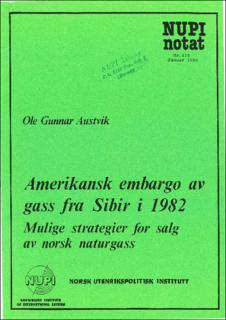Amerikansk embargo av gass fra Sibir i 1982 : Mulige strategier for salg av norsk naturgass
Report
Published version
Permanent lenke
https://hdl.handle.net/11250/3014126Utgivelsesdato
1990Metadata
Vis full innførselSamlinger
Sammendrag
English abstract
The first part of this paper discusses the background for the U.S. attempts to stop the huge Soviet gas supplies to the Western European market in 1982. In particular, the adequacy of using economic pressure as a mean in international politics is discussed. The paper concludes that it seems only to be in a situation of extremely serious crises that it is possible for the U.S. to pursuade the other Western countries to participate in anything but a strategic embargo. A strategic embaro is today performed through the COCOM rules. This was an important reason why the U.S. failed to halt the Soviet gas sales in 1982.
One element of the U.S. policy was that Norwegian gas exports should be increased and used as a substitute. The paper discusses the high-price requirements that was put forward by Norway as a condition to increase her gas sales. On the basis of the analysis in the first part, possible reasons why this policy was not accepted by the purchasing countries is discussed. Some alternative gas strategic options for Norway is mentioned.
The last part of the paper discusses the possibility that the U.S. once again will use economic pressure in order to achieve political goals towards the Soviet Union. Also the possibility that one of the superpowers, either the U.S. or the Soviet Union, can direct their attention to the formulation of Norwegian gas strategy in the future is discussed.

